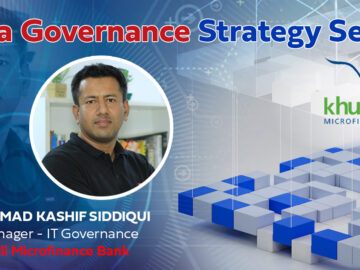“The adoption of digitization will surely accelerate and how quickly Pakistan can adapt to it will determine how quickly we can see our economy bouncing back”, commented Zeeshan Hasib Baig, Country General Manager – Pakistan at Careem, during an exclusive Q&A session with our Editor in Chief on the impact of COVID-19 outbreak on the overall economic landscape of Pakistan and what role can digital players play during this crisis scenario.
1. How do you see the overall landscape of the economy in Pakistan post COVID-19?
The one thing that needs to be kept in mind when assessing the impact is the nature of this crisis. It’s a black swan event that was extremely difficult to predict and be prepared for, which meant very few safeguards were put in place globally. A pandemic of this magnitude has impacted both supply (disruptions in supply chain) and demand (changing consumer preferences), which was never before seen.
The road ahead for Pakistan’s economy is a very challenging one. At the risk of sounding too bleak, no individual, organization or government should believe that a silver bullet will save us all. The Pakistani GDP is expected to a take a 2% hit ($6-8 Billion) in the year, exports declined by $200 million in March, remittances sent back home (usually $2 Billion) took a hit and the service industry, including transport, retail, wholesale amongst others, which accounts for 50% of our GDP, was severely impacted. We already have a quarter of the population living below the poverty line and almost 75 million labor class workers.
I believe that COVID-19 will, and already has, paved a way for a new normal, both for individuals and organizations. With more restrictions on the way we live and work, consumer preferences will change fundamentally and organizations will change, with remote work becoming the normal for quite a few.
In Pakistan, like the rest of the world, the hospitality industry, airlines, travel and leisure, transportation and most major offline players have been severely impacted and will continue to be so for the foreseeable future, while other, more digital centric players like video conferencing and online messaging platforms, e-commerce platforms and digital payment platforms will take advantage of the new normal.
2. What are the challenges and opportunities for food delivery services in the current crisis scenario?
The food and grocery delivery services, including Careem’s food, shops, and delivery services, have a massive opportunity in both the short and long term. Getting something delivered as opposed to going out is naturally the safer option in the short term, which means there is pent up demand in the short term that can be catered by online delivery platforms. More importantly, delivery platforms can be pivotal in public and private efforts in the distribution of necessary supplies to those in need to help flatten the curve, as we at Careem continue to do by partnering with credible NGOs such as Saylani Welfare Trust, Rizq and Shaukat Khanum Memorial Cancer Hospital.
As digital adoption becomes a necessity, consumers in Pakistan are starting to realize the convenience of using such platforms, which leaves them more time to do the things that are important to them. In the longer term we will see greater uptake of such platforms across the board. We may also see offline players onboarding on these platforms to take advantage of a larger customer base and also save on the cost of operating a physical restaurant or shop.
3. What measures have you taken to support your frontline staff, riders/captains?
In the short to medium term, our primary focus is to ensure, more than anything else, that our captains, many of whom rely on Careem as a single source of income, are facilitated to the best of our ability. In that respect, we have taken the following steps, and our working tirelessly to ensure we can help every affected captain in one way or the other.
Facilitating medical insurance – We are facilitating captains to receive medical insurance for hospitalization and ICU in case they or their family members are infected.
Introducing Sick Pay policy – We are providing sick pay financial support for 14 days to any Careem Captain who is diagnosed with COVID-19 or placed in individual quarantine by a public health authority.
Financing support – We are leading discussions with financial institutions to pause car loan payments, and have engaged governments on license fee and stimulus programmes.
Providing Rations and Safety Gears – We are partnering with relevant NGOs to provide rations to as many captains as possible. Careem colleagues in Karachi, Lahore, Islamabad, Multan and other cities have also taken on the responsibility of distributing ration bags for captains and communities.
Awareness Communication for Customers and Captains – We are in constant communication with captains and customers to maintain hygiene standards wherever Careem is still operational. To further these efforts our team has also established an Information Bot on Careem Facebook page for an easier flow of awareness regarding COVID-19 for Careem community.
Flexible Policies – We are ensuring more flexible captain side policies, apart from hygiene requirements of course, so policies such as cancellations are relaxed to provide flexibility to captains due to extraordinary circumstances
Yet, all of this may still not be enough. There is no easy way to describe the current situation: our captains are still in grave danger of losing everything.
Mudassir the CEO and Co-Founder of Careem highlighted all these points in a letter to relevant governments, financial institutions, businesses and the general public to appeal that we cannot help our captains who are part of the gig economy all on our own. Here is an example of the scale of the issue
If we focus just on Careem’s half a million active captains across the region, and assume they need just $500 a month as a bare minimum to cover their most basic financial needs, the captain community needs financial support of $250m per month. It is not feasible for Careem or any other company to fill this gap on its own.
4. How do you see consumer behaviour shifting towards digital during this crisis time and what is your approach while responding and understanding their needs?
Across the world, we see consumer behavior changing in a number of ways. Most evidently, there has been a shift in spending on offline vs online mediums, with internet usage up by 50% and retail consumption dropping by 50% YOY. Online search for some digital brands have even seen an increase of over 100%, food and grocery delivery service adoption is up and 45% consumers are spending more time on social media platforms.
Secondly, home entertainment has seen an unprecedented rise with half the world on lock-down. While stock markets have been in turmoil, the share price of Netflix went up from $298 to over $360 in just 15 days. Some online content is being consumed more than others, such as cooking or home fitness related videos, and search queries for mobile games and consoles has increased substantially.
The way customers spend their money has also changed dramatically. More money is being spent on necessities as discretionary spending dwindles, with people choosing to spend on hygiene products and groceries, spending almost no money on travel, opting to take fewer loans in the face of economic turmoil and choosing to help others out by donating generously and reinforcing the idea of community.
5. With reference to the current lock-down, what recent initiatives have you taken to support and maintain business continuity?
Being a tech based organization and having worked very closely with their peers from across the world, Careem colleagues were able to very quickly adapt to the changing environment and ensure business continuity by working remotely from home. Not surprisingly, working from home is helping us be more productive. Our team leads are also stepping up to the task, ensuring that every team member is aware of their responsibilities and is delivering as per expectations. The key, as we like to say, is not to shy away from over communication.
Ever since the crisis hit, we have constantly been in communication with our captains and customers through not just the app but our highly engaged social media and support channels. Even though mobility is somewhat restricted in the country and we are following all government directions to the letter, in areas where services are still operational, we have introduced contactless deliveries and ensured our captains are following safety protocols to the tee.
Our primary objective has always been to ensure that we do right by our captains in these difficult times, for which many initiatives highlighted earlier have been taken. Being an organization that believes in putting our customers at the core of the business, we have quickly pivoted to focus more aggressively on deliveries and have come together to launch the already planned Careem Super App, which is complete lifestyle app for customers focusing on not just the mobility of people, but also the mobility of things (food, grocery, medicine) as well as financial services that will be releasing soon in Pakistan as well.











